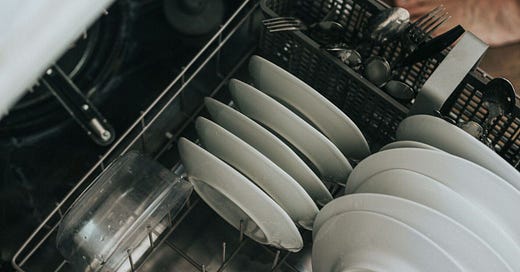If you like your appliances, you can (actually) keep them
Unlike a certain other broken promise.
Happy Monday! I appeared for a rare Thursday “Montalbano Monday” on the
Show to talk about the Alaska LNG pipeline and its prospects. I’m cautiously optimistic, but permitting may be a challenge. You can listen to me talk about it here.In a piece of local interest to the Midwest, I wandered outside of my usual expertise to comment on a North Dakotan Tesla Cybertruck vandal. Is it really that hard to just… not destroy others’ property?
Without further ado…
The Trump Department of Energy just last week withdrew four standards on electric motors, ceiling fans, dehumidifiers, and external power supplies. Congress is also working to disapprove of many burdensome Biden-era standards through the Congressional Review Act, which prevents an agency from proposing a similar bill in the future.
Secretary of Energy Chris Wright said that removing these regulations means “returning freedom of choice to the American people, ensuring consumers can choose the home appliances that work best for their lives and budgets.”
In February, the Department of Energy postponed the effective date of three overburdensome Biden-era efficiency rules applying to central air conditioning (A.C.) systems and heat pumps, walk-in coolers and freezers, and gas tankless water heaters.
The Biden administration had attempted to make more expensive a myriad of appliances and attempted to ban gas stoves. Water heaters, residential clothes washers and dryers, dishwashers, and refrigerators were all affected. The Alliance for Consumers estimated that upgrading a house to meet these standards would cost over $9,000.
A Reason magazine article makes plain why higher efficiency standards hurt consumers: appliances don’t work nearly as well.
My 30-year-old Bosch dishwasher was a marvel—efficient, precise—scouring dishes in 45 minutes like a Prussian drill sergeant on a deadline. Last month, it died. I dropped $800 on a sleek successor, expecting progress. Instead, I got a two-hour grease-smearing farce that leaves forks, like my optimism, caked in the grime of dashed hopes—a victim of the DOE’s regulatory straitjacket.
My 1979 brick ranch creaks on into senescence, its heater, air-conditioning, fans, and water heater—bastions of a bygone era of appliance liberty—teetering. Replacing them likely means paying thousands of dollars for lesser-able machines. That’s been the story for decades: as tech leaps forward, appliances regress. Until now…
My dishwasher is the poster child. A 5-gallon water limit (10 CFR 430.32) strangles it—my old Bosch used ten gallons. A 307 kWh/year energy cap starves its heater and pump—my German-engineered gem used to shoot scalding water and dry dishes in minutes. New efficiency rules bloated cycles to more than two hours just to scrape at grease—four when I have to double wash.
The problem with “efficiency” is that when an appliance doesn’t do its job correctly the first time, you use more energy and water to make up the difference. I have largely given up using the dishwasher in my apartment after the prior one — which worked like a dream! — was replaced by maintenance for a model that leaves half of my dishes with bits of food still caked on and hard water stains on the other half. Where is the “efficiency” in using at least twice the water and wasting my time?
Consumers stand to save money, time, and energy thanks to the administration’s savvy move to roll back burdensome appliance standards. If you like your appliances, you can keep them — unlike a certain broken promise on another subject.
This piece was originally published at Center of the American Experiment on April 4, 2025.




finally got around to reading the actual essay. very well done, ma'am, very well done.
Don't know if you saw this today. https://www.hollandsentinel.com/story/news/environment/2025/04/04/coalition-request-for-hearing-on-palisades-nuclear-power-plant-restart-denied-covert-twp/82877669007/